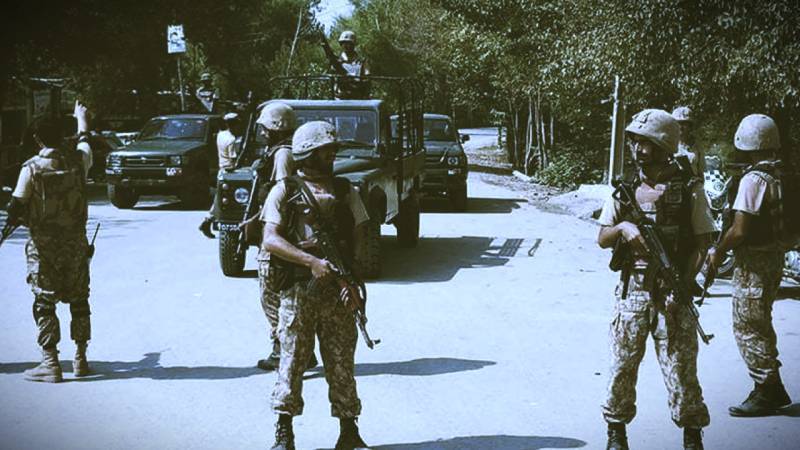
Days after an attack on a security checkpost in North Waziristan was repulsed, the military early on Monday launched an intelligence-based operation against militants inside Afghanistan.
Kabul, however, has warned Islamabad to expect retaliation.
In a statement issued on Monday, the Ministry of Foreign Affairs said the strikes in border areas of Afghanistan were launched in retaliation to a weekend attack by militants on a security checkpost in Mir Ali, North Waziristan. The militants had rammed an explosives-laden vehicle into the checkpost followed by multiple suicide attacks. The attack and ensuing gunfight with the militants left at least seven soldiers dead, including an officer of Lieutenant Colonel rank and an officer of captain rank. Six attackers were also killed.
"This morning Pakistan carried out intelligence-based anti-terrorist operations in the border regions inside Afghanistan," the statement read, adding that the target of the strikes were militants belonging to the Hafiz Gul Bahadur Group, which, along with the Tehrik-i-Taliban Pakistan (TTP), have been striking at security forces and civilians inside Pakistan.
Tensions between Pakistan and the new Taliban regime in Kabul have increased since 2021 after Afghanistan fell to the militant group. Islamabad has accused the Afghan Taliban, who have formed an interim government in Afghanistan, of providing safe haven to terrorists associated with the Tehreek-e-Taliban Pakistan (TTP), who are based in the border regions of Afghanistan and use it as a launching pad for strikes in Pakistan. The Taliban denies that it hosts Pakistani militants and other international jihadists.
"Certain elements among those in power in Afghanistan are actively patronising TTP and using them as a proxy against Pakistan," the statement from the foreign office said.
The ministry said that over the past two years, Islamabad has repeatedly conveyed its serious concerns to the Interim Afghan Government - led by the Afghan Taliban - over the presence of terror outfits, including the TTP, inside Afghanistan.
"These terrorists pose a grave threat to Pakistan's security and have consistently used Afghan territory to launch terror attacks inside Pakistani territory."
The foreign office said Pakistan has repeatedly urged the Afghan authorities to take concrete and effective action to ensure that Afghan soil is not used as a staging ground for terrorism against Pakistan.
"We have also called on them to deny safe havens to TTP and to hand over its leadership to Pakistan," the statement said, adding that the Afghan Taliban have ignored the support extended by Pakistan to the people of Afghanistan over the last several decades.
"We urge these elements in power [in Afghanistan] to rethink the policy of siding with Khwarij terrorists shedding the blood of innocent Pakistanis and to make a clear choice to stand with the people of Pakistan."
Noting the challenge that the Afghan authorities face from the threat posed by the TTP, Islamabad offered to continue to work towards finding "joint solutions" in countering terrorism and to prevent any terrorist organisation from sabotaging bilateral relations with Afghanistan.
Meanwhile, security analysts suggested that Monday's strikes across the border, like the ones in Iran and India before that, are signals from Islamabad that despite its economic and political crises on the domestic front, its defences remain as strong as ever.
"This is a signal from Pakistan that whichever neighbour hits us, they will have to pay," security analyst Ejaz Haider told The Wall Street Journal. He, however, warned that tit-for-tat actions could further destabilise two fragile nations, but hostilities are unlikely to spill over into a broader conflict.
Read More From Ejaz Haider: To Deal With TTP, Pakistan Must Inflict Pain On TTA
Kabul, however, has vowed to retaliate over Monday's strikes, with Afghan government spokesperson Zabiullah Mujahid calling the strikes "a reckless action."
He claimed that Pakistani airstrikes left five women and three children dead in the eastern Afghan provinces of Paktika and Khost, both of which border Pakistan.
"Pakistan should not blame Afghanistan for the lack of control, incompetence and problems in its own territory," said Mujahid. "Such incidents can have very bad consequences which will not be in Pakistan's control."
Pakistani security officials denied that civilians had been killed.
The United Nations reports support Islamabad's complaints that Kabul allows certain foreign militants to use Afghan soil. Iran and other Central Asian nations are also concerned about foreign militants operating from Afghanistan.
In 2022, a US drone strike in Kabul claimed to have killed the al Qaeda leader Ayman al-Zawahiri.

